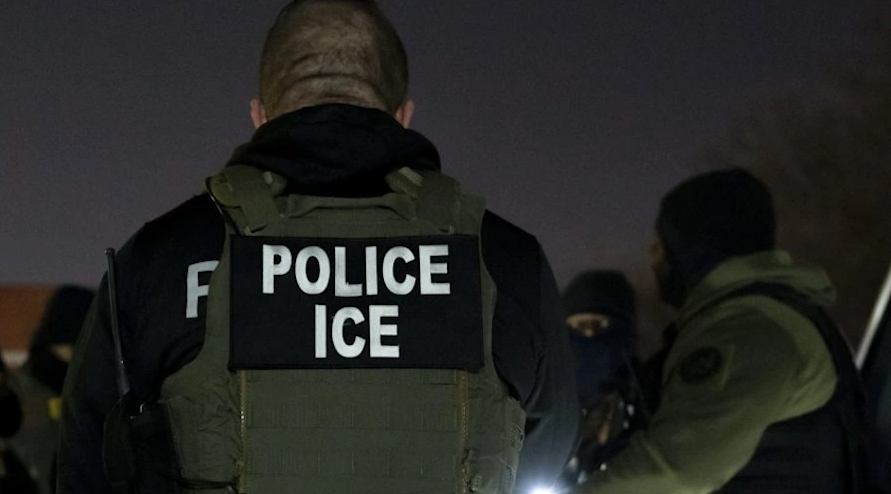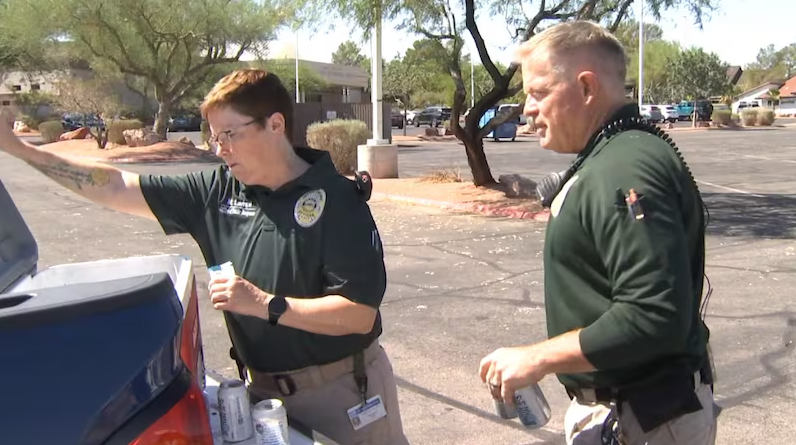Security guard gets prison time for pandemic-era shooting at Las Vegas convenience store

Judge hands down 5-14 year sentence in case that highlighted pandemic tensions
Nearly five years after a deadly confrontation over COVID-19 store policies, a Las Vegas judge has sentenced former security guard Kegia Mitchell to five and a half to 14 years in prison for the shooting death of 56-year-old Thomas Martin outside a northeast valley 7-Eleven.
The sentencing Thursday brought closure to a case that exemplified the heightened tensions and tragic consequences that sometimes erupted during the pandemic’s strictest enforcement periods. Mitchell, who entered an Alford plea in April, tearfully addressed the court, maintaining she never intended to take Martin’s life.
Fatal encounter over store capacity limits
The incident occurred on August 26, 2020, when businesses across Nevada were operating under strict capacity limitations to prevent COVID-19 transmission. Mitchell, working as an armed security guard, was stationed at the convenience store entrance to regulate customer flow—a common sight during the pandemic’s peak.
According to court testimony, Martin attempted to enter the store but was blocked by Mitchell, who had just allowed another customer inside. What began as a dispute over line-cutting escalated into a physical altercation that would end in tragedy. Security footage showed the confrontation moving from inside the store to the parking lot, where Mitchell drew her weapon and ultimately fired the fatal shot.
Pattern of aggressive behavior revealed
Prosecutors presented evidence suggesting this wasn’t Mitchell’s first violent encounter while working security. Just 19 days before Martin’s death, she was recorded dragging another customer across the parking lot—an incident that prosecutors argued demonstrated a pattern of excessive force.
“How many times did we hear about 7-Eleven clerks shooting people and killing them during COVID? That wasn’t a thing—that didn’t happen,” Chief Deputy District Attorney Christopher Hamner told the court. He argued that Mitchell’s actions were unique in their severity, noting that Martin’s only offense was cutting in line.
The prosecution emphasized that Martin was unarmed throughout the encounter and never attempted to grab Mitchell’s weapon. The confrontation, they argued, only escalated because Mitchell refused to release Martin’s shirt when he tried to leave.
Troubling details emerge about weapon possession
During the investigation, concerning details emerged about Mitchell’s preparedness for her security role. She had failed her initial firearms safety training and later told detectives she had received the gun as a Mother’s Day gift. These revelations raised questions about the adequacy of training and oversight for armed security personnel during the pandemic.
Mitchell’s defense team argued for leniency, citing the enormous pressure faced by frontline workers tasked with enforcing unpopular pandemic restrictions. They portrayed their client as someone overwhelmed by circumstances rather than a deliberate aggressor.
Judge emphasizes location of shooting
District Court Judge Tierra Jones acknowledged the complexity of the case while delivering the sentence. She noted that while the initial confrontation inside the store was problematic, the critical issue was Mitchell’s decision to continue the altercation outside.
“We cannot just have the citizens of Clark County shooting people who don’t comply with what it is that they ask them to do,” Jones stated, emphasizing that Mitchell’s role as a security guard came with responsibilities, not unlimited authority.
The judge’s decision to impose a sentence ranging from five and a half to 14 years reflected both the seriousness of the offense and consideration of the unique circumstances surrounding pandemic-era enforcement.
Family finds justice after long wait
For Brandon Martin, the victim’s son, the sentencing marked the end of a nearly five-year quest for justice. Thomas Martin, a grandfather who was eagerly awaiting the chance to meet his newest granddaughter, left behind a devastated family.
“He was one hammer, was not afraid of that gun, swatted it away at least five times,” Brandon Martin wrote on social media following the sentencing, celebrating what he saw as justice for his father while acknowledging that no punishment could ease the pain of loss.
The younger Martin had previously described his father as embodying the “Aloha spirit,” a man whose life was cut short over what amounted to a dispute about waiting in line.
Broader implications for security industry
The case raises important questions about the use of armed security guards in retail settings and the level of training required for those carrying weapons in public-facing roles. The pandemic created unprecedented situations where businesses relied heavily on security personnel to enforce health mandates, sometimes with tragic results.
Mitchell’s transition from house arrest to prison custody marks the conclusion of criminal proceedings, but the case serves as a stark reminder of how quickly situations can escalate when firearms are introduced into routine disputes.
Looking back at pandemic tensions
As Las Vegas and the nation move further from the acute phase of the pandemic, cases like this offer sobering lessons about the human cost of those tumultuous times. What began as an effort to protect public health through capacity restrictions ended in an irreversible tragedy that destroyed multiple lives.
The sentencing brings legal closure to one of the more shocking incidents from the pandemic era in Las Vegas, when everyday interactions carried new risks and ordinary disputes could turn deadly in seconds. For both families involved, the consequences of that August night in 2020 will resonate for years to come.
Image Source: https://www.yahoo.com/news/las-vegas-judge-sentences-security-192036242.html
Category: Breaking News
Subcategory: Crime & Safety
Date: 07/11/2025




